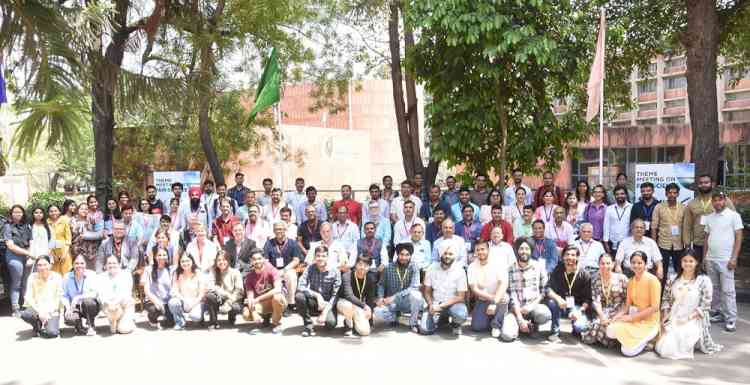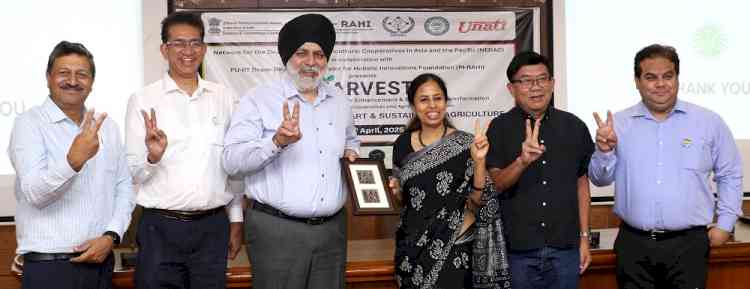Webinar on “Dynamics of Indo-Pak Relations – The Way Ahead”
Held at the Department of Defence and National Security Studies, PU

Chandigarh: The Department of Defence and National Security Studies, Panjab University, Chandigarh, as part of its ongoing online academic endeavours during the Covid-19 lockdown, organised a Special Webinar on the theme – “Dynamics of Indo-Pak Relations – The Way Ahead” by Dr Shalini Chawla, Distinguished Fellow, Centre for Air Power Studies (C.A.P.S.) today.
Dr Chawla highlighted the major developments in the India-Pakistan relationship in the last few decades starting from the composite dialogue between Prime Ministers Indra Kumar Gujral and Nawaz Sharif in 1998, followed by the Agra Summit of 2001 between PM Vajpayee and Gen Musharraf etc. Then she discussed how the present NDA government made various substantive efforts un improving ties and Pakistan’s response starting from Nawaz Sharif attending the swearing-in ceremony of Prime Minister Narendra Modi. The major turning point here was when just after a week of PM Modi's unannounced visit to Pakistan, there was a major terrorist attack at the Pathankot Air Base. This resulted in the suspension of dialogue by India.
India now began making effort aimed at diplomatic isolation of Pakistan by highlighting it’s policy of Terrorism at various international forums. It was the effect of these sustained efforts which improved India’s position at the international level vis-à-vis Pakistan and gained more acceptance for India’s policy towards Pakistan. This was visible when India’s Air Strikes at Balakot, after the Pulwama terrorist attack, were not condemned by any nation.
The Pakistani Military Establishment was not happy with the Nawaz's Sharif government’s positive response for the newly elected Indian government’s initiatives at improving relations. This was one of the major factors that led to the removal of the Nawaz Sharif from power. The present government of Imran Khan in Pakistan came to power with the slogan of creating a 'Naya Pakistan'.
The Abrogation of Article 370 in Jammu and Kashmir came as a shock to Pakistan as it challenged it’s identity and narrative. Pakistan has always been portraying itself as a insecure nation which is under constant threat from it’s powerful neighbor, India. Pakistan has always been over obsessed with Kashmir issue while also continuously propagating the narrative that India has illegally occupied Jammu and Kashmir and the Kashmiri people are being oppressed. After the Article 370 abrogation, Pakistan revised it’s narrative and started targeting the Indian Government calling it “Islamophobic”. This was aimed at weakening India’s improved relations with major middle eastern countries. This new narrative also helped Pakistan in getting support from various Islamic countries, including Turkey and Malaysia.
Pak PM Imran Khan in his speech at the United Nations accused India of human rights violations in Kashmir and tried to internationalise the issue. Pakistan strengthened it’s narrative against India by managing Pakistan-friendly media coverage in the US and other international media on the Kashmir issue. It also raised the nuclear bogie claiming that the Kashmir issue can lead to a war with India which would possibly turn nuclear. Pakistan is also engaged in an anti-India propaganda campaign on the social media.
Pakistan has recently created a new terrorist organization for Kashmir named 'TRF or The Resistance Front. It has brought members of various terrorist organizations under it’s banner since it has not been banned. Pakistan has been increasingly relying on local Kashmiri terrorists since infiltration on the line of control has become difficult.
Despite the ongoing Covid-19 pandemic, the Pakistani government is using it’s 'Indian Threat” narrative to justify increase in military spending. The upcoming US withdrawal from Afghanistan is only going to strengthen Pakistan’s hold on that country through Taliban, which it will later used against India. Claiming India to be a threat to entire Muslim population Pakistan is likely to continue it’s covert war.
The webinar was attended by various faculty members, serving armed forces officers pursuing courses in the department, research scholars and students.


 cityairnews
cityairnews 








